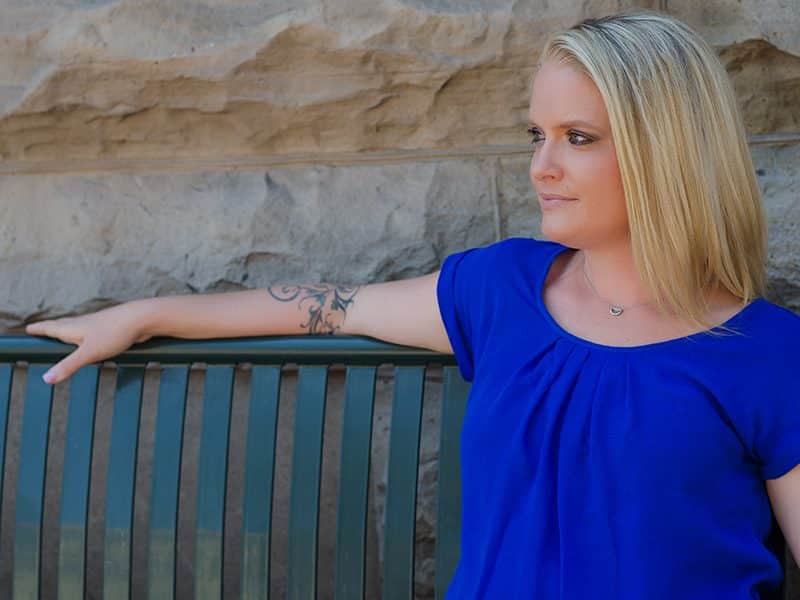By Melissa Jane Kronfeld & Megan Legband
Megan Lundstrom is a powerhouse advocate for women trapped in commercial sexual exploitation. As a survivor, Megan understands from a deeply personal level, the innumerable obstacles that individuals confront when trafficked for sex, and she has dedicated her life to advocating for women and girls trapped in the slave trade.
As Executive Director of Free Our Girls, a Colorado-based nonprofit that provides direct services to survivors and equips other agencies to spot and combat trafficking, Megan is highly engaged in the movement, leading the organization and traveling around the country to provide necessary and critical public education and awareness about the prevalence of human trafficking.
With a B.S. in Finance and an M.A. in Sociological Theory, Megan also serves as a Survivor Consultant for the Department of Homeland Security. Now happily married in a committed and loving relationships, Megan enjoys writing and traveling with her family.
Check out what happened when we caught up with Megan to talk about the fight to #EndSlaveryNow!
What is one fact that every person should know about slavery?
Exploitation occurs on a continuum, and it is happening in every community in every country.
How were you able to escape from a life of slavery & what did you decide to do to help others with your experience?
My escape was both a physical and psychological process that began the day I was lured into the sex trade. It took me six attempts over the course of five years to physically escape. The psychological process is ongoing, but it took almost two years from my final escape to begin to understand that I had been manipulated.
My personal healing journey has involved bibliotherapy – I have read lots of articles and books on various forms of abuse, everything from domestic violence to cults. It turns out that pimp-controlled trafficking, which I survived, meets all 15 characteristics of a cultic group. This has been my research the past 4 years, and the data has shaped my organization’s services, and how I consult with local agencies and businesses when it comes to identifying and responding to potentially trafficked women.
What is the most critical obstacle preventing us from having a slave free world?
Demand. Humans are consumers, and where ever there is a want or need, there is an opportunity for monetary profit, and with that comes potential for exploitation.
What is the most important lesson you have learned while fighting for freedom?
Escaping a trafficker is only the first terrifying, difficult step. Escaping racism, poverty, and trauma … it is a lifetime journey to freedom. Domestic anti-trafficking efforts are almost entirely focused on awareness and emergency services (which are vital pieces, don’t get me wrong!), but support and services and policy are needed to address the long-term needs.

Why do you believe the Millennial generation will be the one that can end slavery?
I think us millennials get a bad rap because we experience financial security (or the illusion of it) very differently than previous generations. We are more aware of supply chains, the excessiveness of American consumerism, and how communities are stronger when each individual in it has their basic needs met daily. Millennials also have a radically different perspective of what career paths look like and how workplaces can meet the needs of employees to increase productivity and creativity. Specifically, when it comes to the sex trade, I think as we continue to advocate for gender equality in opportunities, all voices are being welcomed and valued at the table, and this in turn personalizes issues like the sex trade – women are being seen more and more as humans than objects.
What does a slave free world look like to you?
Something my children or grandchild will be able to see. I am very proud to be one of the many amazing emerging leaders in the anti-trafficking movement. We are setting a precedent and creating history.
What is one thing every reader can start doing right now to help end slavery?
Each day, seek out a vulnerable person, and meet a basic need they have – whether that is making eye contact and smiling at a homeless person you walk past on your way to work, or helping a single mother move, volunteering at a youth-serving organization, or donating to a charity you believe wholeheartedly in. Traffickers do these things every day, sometimes 10 times per day. We can all be a safe person to stand in a void. That is one less vulnerable moment for a trafficker to step into.
Profiles In Abolition is an in-depth look at the influencers, innovators & thought leaders in the modern anti-slavery movement. An accompaniment to Millennial Magazine’s ongoing 10-part series exposing modern slavery – a project of the Nexus Global Youth Summit (catch up with Part One, Part Two, Part Three, Part Four & Part Five) – Profiles In Abolition will examine a diverse & inspiring array of advocates whose critical voice must be heard.
Want to learn more from the world’s leading luminaries in the fight to #EndSlaveryNow? Sign up for the Nexus Anti-Slavery Speaker Series, a weekly conference call with the men and women on the front lines of the modern abolition movement! This call is open to the public and everyone is welcome to listen in! Click here to register for free. Then learn more about modern slavery by following Nexus on Twitter, Instagram & Millennial Magazine!
